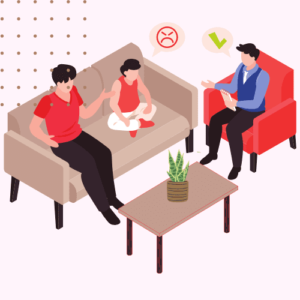
Child Schizophrenia Test
Answer these simple questions to understand more about your Child Schizophrenia. We share instant results and keep your information confidential.

What is Child Schizophrenia Test?
Child schizophrenia assessment involves evaluating children for symptoms of schizophrenia, a severe mental disorder characterized by distorted thoughts, emotions, and behaviors. Clinicians use interviews, observation, and standardized tests to assess cognitive, emotional, and social functioning. They look for hallucinations, delusions, disorganized speech, and negative symptoms, considering the child’s developmental stage. Early detection and intervention are crucial for effective management and improved outcomes. However, it’s important to note that schizophrenia is a rare condition in children, and other developmental or psychological disorders should be ruled out during the assessment process.
Who can benefit from this Child Schizophrenia Test?
Children who show concerning behavioral, emotional, or cognitive symptoms that may indicate the presence of schizophrenia or other related disorders can benefit from Child Schizophrenia Test. This assessment is essential for identifying early signs of mental illness and providing appropriate interventions and support. Additionally, children with a family history of schizophrenia or other psychiatric conditions may also benefit from assessment to monitor their mental health and prevent potential future complications. Early detection and treatment can improve long-term outcomes and enhance the child’s overall well-being and functioning.


Child Schizophrenia Test Accuracy
The accuracy of Child Schizophrenia Test can vary depending on several factors, including the experience and expertise of the clinicians conducting the evaluation, the specific assessment tools used, and the complexity of the child’s symptoms. While the assessment process aims to provide an accurate diagnosis, it can be challenging to differentiate schizophrenia from other developmental or psychological disorders, especially in children. Consequently, early detection may be challenging, and misdiagnoses can occur. Collaborative and comprehensive evaluations involving multiple professionals can enhance accuracy and minimize potential errors in diagnosis and treatment planning.
Types of Child Schizophrenia Test
Clinical interviews:
A structured or semi-structured conversation between a clinician and the child to assess symptoms, history, and functioning.
Observational Test:
Observing the child’s behavior, interactions, and responses in various settings to gather information about their social and emotional functioning.
Rating Scales:
Standardized questionnaires completed by parents, teachers, or caregivers to assess the child’s symptoms and behaviors.
Neuropsychological Testing:
Assessing cognitive functions like memory, attention, and executive functioning to understand the child’s neurological and cognitive abilities.
Psychiatric Evaluation:
A comprehensive assessment by a child psychiatrist to determine the presence of any mental health disorders, including schizophrenia.
Diagnostic Criteria:
Using established diagnostic guidelines (e.g., DSM-5) to evaluate if the child meets the criteria for schizophrenia based on their symptoms and history.
Handling Child Schizophrenia Issues
Handling child schizophrenia issues requires a comprehensive and compassionate approach involving various aspects of support. Schizophrenia is a severe mental disorder that can have a profound impact on a child’s life and the family as a whole. It’s important to note that I am an AI language model and not a mental health professional. For personalized advice, please consult a qualified healthcare provider. However, I can provide some general guidance on how to approach child schizophrenia issues:
- Early Identification and Professional Help: If you suspect that a child is showing signs of schizophrenia, seek professional help as soon as possible. Early identification and intervention can improve outcomes and help manage symptoms more effectively.
- Medication and Treatment: Schizophrenia in children is typically treated with a combination of antipsychotic medications, psychotherapy, and other forms of therapy. It is crucial to work closely with a child psychiatrist or mental health professional to develop an appropriate treatment plan tailored to the child’s specific needs.
- Family Support: Schizophrenia not only affects the child but also the entire family. Providing emotional and practical support for the family can be beneficial. Family therapy or support groups can be valuable in helping family members cope with the challenges of living with a child with schizophrenia.
- Create a Stable and Nurturing Environment: Maintaining a stable and supportive home environment is crucial for children with schizophrenia. Reducing stressors, maintaining routines, and providing a nurturing atmosphere can help manage symptoms and enhance the child’s overall well-being.
- Communication: Open and honest communication with the child about their condition, treatment, and emotions is essential. Encourage the child to express themselves and their feelings, and actively listen to their concerns.
- Educate Yourself and Others: Learn as much as you can about schizophrenia in children to better understand the condition and how to support the child. Educate other family members, teachers, and caregivers about the illness to foster a supportive network.
- Monitor Symptoms: Keep track of the child’s symptoms and progress regularly. This will help in identifying any changes or potential triggers that may affect the child’s mental health.
- Encourage Social Interaction: Social isolation can exacerbate symptoms in children with schizophrenia. Encourage social interactions, but be mindful of overwhelming situations that may trigger anxiety or stress.
- Address School Needs: Collaborate with the child’s school to ensure that they receive appropriate accommodations and support. This may include an Individualized Education Plan (IEP) or a 504 Plan to address their educational needs.
- Self-Care for the Caregiver: Taking care of a child with schizophrenia can be emotionally and physically taxing. Remember to prioritize your own well-being and seek support for yourself when needed.
Remember, every individual with schizophrenia is unique, so it’s crucial to work closely with mental health professionals to develop a personalized approach to treatment and support. Early intervention and consistent care can significantly improve the child’s quality of life and overall prognosis.